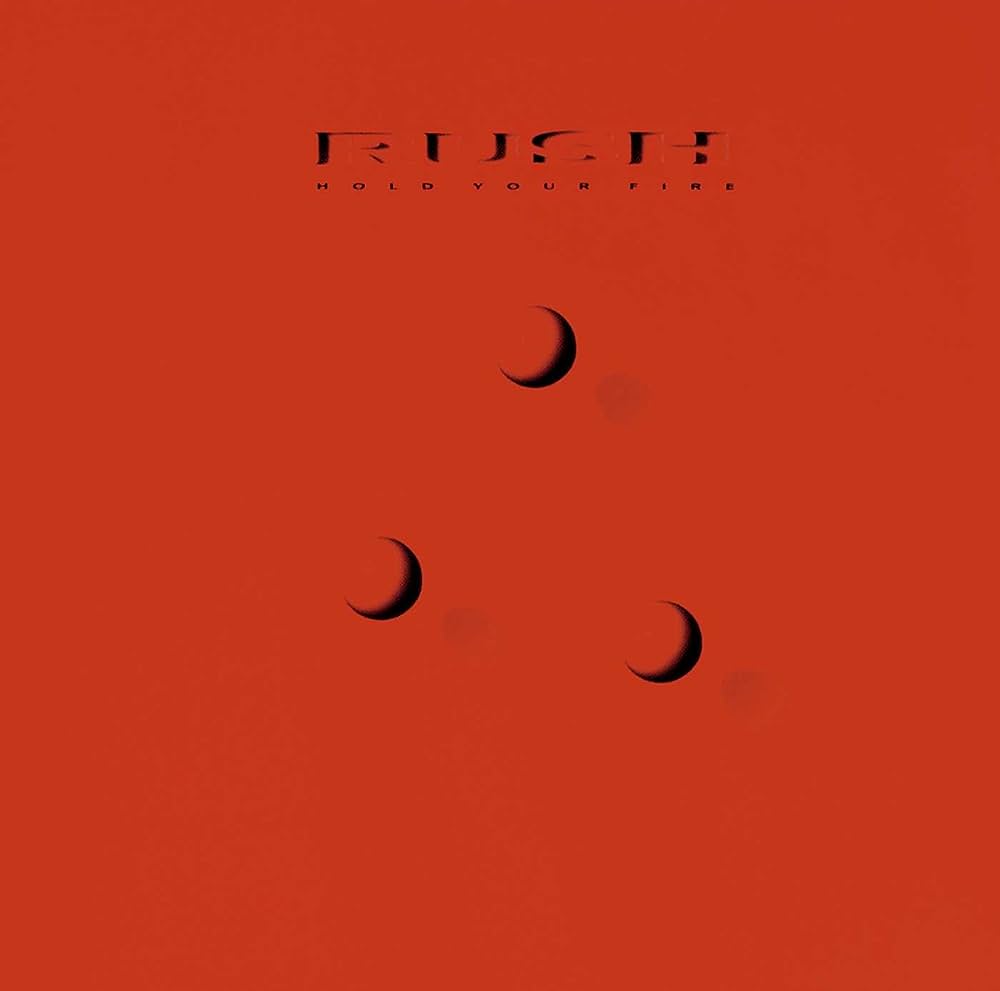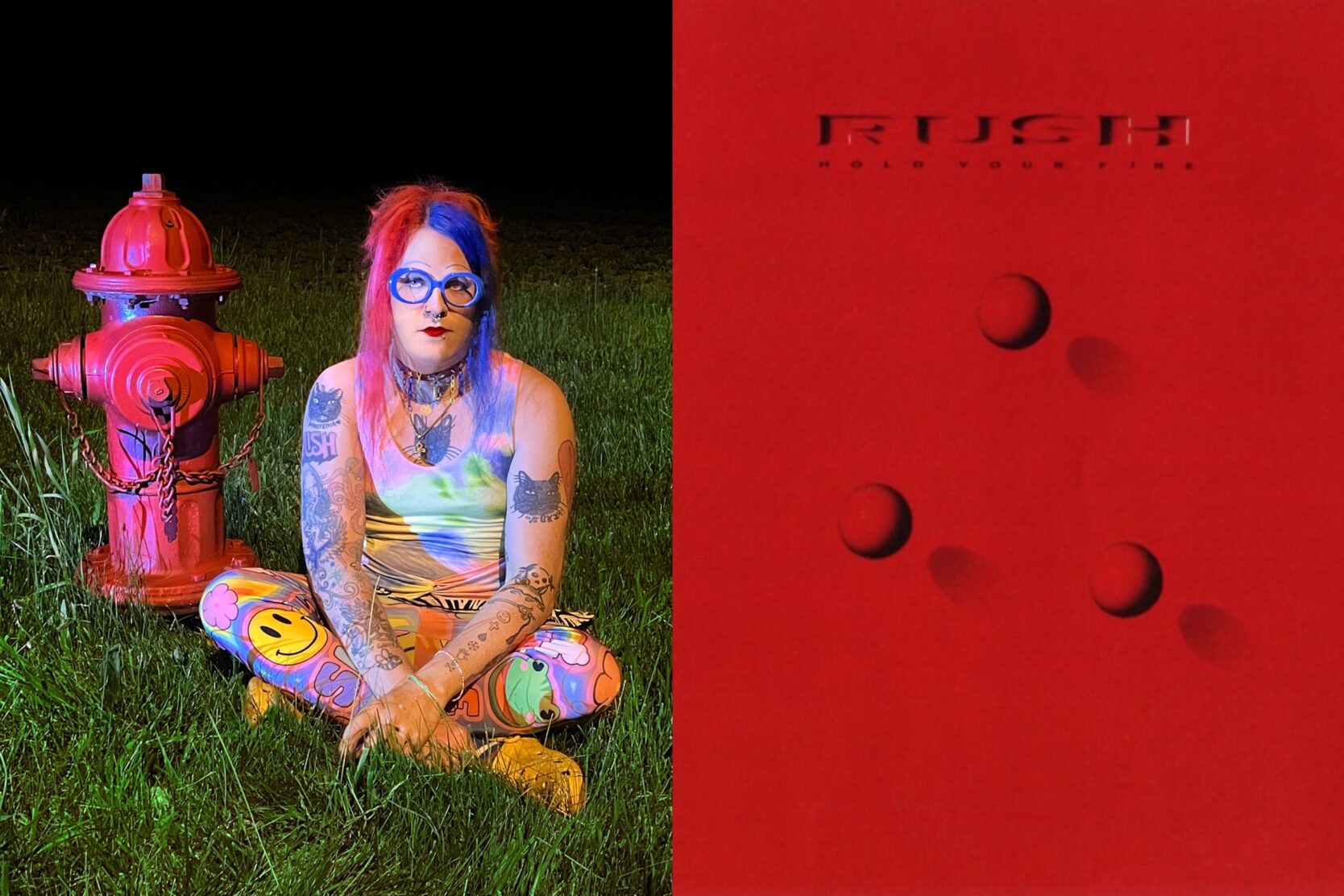Welcome to Band Jury, a SPIN series in which artists defend black sheep albums they feel deserve another listen. These are projects that, for whatever reason (middling sales, negative reviews, a misunderstood stylistic shift), have fallen slightly out of fashion — or perhaps never reached it to begin with.
The Defender: Angel Marcloid
Qualifications: The singer, songwriter, multi-instrumentalist, producer, and studio maverick who, as Fire-Toolz, makes thrillingly unclassifiable, avant-garde music pulling from prog, metal, screamo, jazz-fusion, industrial, New Age, and other genres that probably don’t even exist. Her latest album is the April-released I Am Upset Because I See Something That Is Not There.

The Defended: Rush’s 1987 album, Hold Your Fire
Overview: Mixed critical reception, including a two-star review in Rolling Stone’s Album Guide and a three-star score from AllMusic; peaked at No. 13 on the Billboard 200, marking their lowest placement since 1978; hit Billboard‘s Mainstream Rock chart with “Time Stand Still” (No. 3), “Force Ten” (No. 3), and “Lock and Key” (No. 16); one of their lowest scores (3.21/5.0 — 15th out of 19 studio albums) on fan-review site RateYourMusic

Also Read
Geddy Lee Unearths ‘Lost’ Solo Demos

Throughout four decades together in the circus of arena-packing prog-rock, the members of Rush — singer-bassist Geddy Lee, guitarist Alex Lifeson, and late drummer-lyricist Neil Peart — remained three of the genre’s most upstanding gentleman: virtuosos equally witty and wise. (I rarely use the word “delightful” with a straight face, but that’s the best way to describe my conversation with Lifeson for SPIN a couple years ago.)
But when Angel Marcloid, who records music under the name Fire-Toolz, first heard Rush at age 3 — it might have been 5 or 6; she’s not sure — these cordial Canadians didn’t exactly put off that vibe.
“When you’re young and you see villains on TV, you call them ‘bad guys,'” Marcloid says, recalling how she savored the band’s 1976 album, 2112, in her bedroom, with the tape most likely passed along by her rock-loving parents. “I remember hearing the first song after the [overture] in ‘2112,’ and it’s so heavy, with Geddy’s high vocals just yelling, and the guitars all loud and distorted. It just sounds pissed-off. I remember going up to my mom and being like, ‘These guys are bad guys’ because the music just sounded mean. She told me, ‘No, not really. They’re nice people.’ I remember just being like, ‘Oh, good people can make this mean-sounding music?'”
It was a pivotal lesson in the transportive power of sound — oh, shit, you can use music to become a character, to embody far-flung feelings, to inhabit other worlds. And 2112 became a gateway album to other gateway albums, including Rush’s love-it-or-hate-it 1987 LP, Hold Your Fire. For some fans, it’s the nadir of the band’s catalog, a keyboard-bloated blemish after a run of classics. For others, it’s a slick, studio-sculpted, but still-satisfying glimpse of an alternate-reality Rush — one that embraced concepts like sampled Chinese flutes (“Tai Shan”) and New Wave guest singers (Aimee Mann’s glacial croon lifts the hooky chorus of “Time Stand Still”).
Let’s call the overall response “lukewarm” — not even the adorably awkward video for “Time Stand Still” could convince those haters with scorn for Geddy’s synths. (The band members have also talked some high-profile shit about “Tai Shan.” We’ll get to that later.) But even if the modern-day fan assessment lingers below average, Hold Your Fire does court a sizable cult following. It’s mainly about whether you’re willing to accept some corniness with your crazy time signatures.
“I have a suspicion that they were a little embarrassed about being so heart-on-sleeve,” says Marcloid. “I understand because pretty much every rock artist went through the ’80s phase with the synths. By the time the ’90s came, all the reverb dried up, and they went, ‘Oh, god, our hair! Oh, god, those clothes! Oh, god, those keyboards! What were we thinking?’ It just kinda pisses me off a little bit.”
Before we get to Hold Your Fire, I know you first heard 2112 as a kid. Can you take me on your journey as a Rush fan?
The opening to 2112 takes me back into being really, really young. I think that’s kind of how it started. My brain was developing when my parents were listening to [1984’s Grace Under Pressure], and then there was [1985’s] Power Windows, although I was like 3 or 4 when Hold Your Fire was on the airwaves. Not sure if my parents were turned off by all the synthesizers or not, but I was mostly listening to other Rush albums. Later on, somehow I got a hold of Hold Your Fire, and I remember really identifying Rush with that album. I played guitar growing up, but I always just wanted keyboards. My parents were a little hesitant to get me into that. I think they just wanted me more into rock music or whatever.
One of my other big Rush memories is that my parents went to a yard sale. It was at my elementary school, and my principal was selling a bunch of used records, and my parents brought home a ton of old Rush records. Some of them were even doubles. I would sit in the living room with the records all spread out around me, the lyric sheets out. I couldn’t read very well at the time and didn’t know what the big words meant, but I just remember being fascinated by the lyrics.
Reading the lyrics to Hemispheres and being turned on to Greek mythology — that started to become a fascination of mine. I remember reading the lyrics to “The Sphere,” a short acoustic track, and for some reason, at such a young age, I knew exactly what the lyrics meant. Talking about the balance between heart and logic, or emotion and scientific thinking — that kind of left brain/right brain dichotomy.
Rush have been pretty influential in your visuals, even beyond this album.
It’s the synthesis of the orbs on the Hold Your Fire cover and the lyrics from the song “The Sphere.” I don’t know if they’re related as far as how they conceptualized things. They’re always shouting out previous albums in their artwork and stuff. That’s such a prog-ass thing to do. I started adopting the red fire hydrant in my artwork — it’s shown up in a bunch of my videos and a couple album covers. I’m gonna be capitalizing on it a lot more in the future.
People who don’t like Rush really don’t like Rush, but Hold Your Fire is even divisive within the Rush fan community. Then there are the band members themselves: Geddy called “Tai Shan” an “error,” and Alex called it “a little corny” and “one of the worst” Rush songs.
I mean, it is [corny]! But it’s sincere! Corny always means sincere, unless it’s really contrived, and then it’s a different kind of corny. When people are so saccharine and melodramatic and sincere, it can come off like that. I don’t think they were necessarily trying to be someone they weren’t. I don’t want to say the way they look back at it is wrong because they know what that was like and what they were doing, but I have a suspicion that they were a little embarrassed about being that heart-on-sleeve about things. I understand because pretty much every rock artist went through the ’80s phase with the synths. By the time the ’90s came, all the reverb dried up, and they went, “Oh god, our hair! Oh god, those clothes! Oh god, those keyboards! What were we thinking?” It just kinda pisses me off a little bit.
I understand going through a phase and needing to shift gears in a really big way all the sudden. We all go through that in our lives where we have these huge growth spurts — we end up dressing different, acting different. I remember reading that Geddy said “Tai Shan” was a mistake. That fucking hurt. That hurt. Because that song is a spiritual masterpiece. Yeah, it’s fucking corny. Those pan flutes — I fucking get it. But the song is about standing on a sacred mountain and having a spiritual experience. Calling that a mistake is just wrong to me.
In the ’90s, people didn’t look back at the ’80s production and aesthetic with the same fondness that they do now. There was just a general feeling of wanting to be reactionary, distancing themselves from that style. This album, though, is peak late ’80s.
Yup, absolutely. To me it sounds very late ’80s. I think in the mid-’80s period, they were still a little more rock-oriented about the synths. On Grace Under Pressure, the beats were more driving, and there was a bit more 4/4. Grace Under Pressure, despite being really synth-heavy, makes me think of a fist. [Makes an intense rock fist.] It’s still rock music — “Distant Early Warning” is still a rock anthem. But the Hold Your Fire era was very airy and beyond arena-rock — it sounds like they’re in even bigger spaces than area. It’s very soft and glistening. The late ’80s is my favorite era of music, that peak right before people threw away the keyboards and cut their hair.
There are two other Rush records that I thought might qualify [for defending]. Their next one, [1989’s] Presto — people don’t seem to like that one very much either. I think that’s tied with Power Windows as my second-favorite. And then a lot of people don’t like [1975’s] Caress of Steel because that’s when they got really weird.
“Time Stand Still” always stands out on Hold Your Fire — I think it’s the only featured guest vocal in their catalog. Maybe because of that, along with how catchy and slick it is, a lot of fans just decided they hated the song.
They thought Rush was selling out!
They probably did think that. I really love that song.
Oh, god, me too! The way Rush sold out was that they sold out in every single era — they created music that, although it didn’t blow up super huge, still adapted to the times. Their ’70s records sound like ’70s rock; their ’80s records sound like ’80s rock. I think that feature helped them get a little closer to “top singles” status. They’ve always adapted, and I appreciate that. But they haven’t adapted so much that they’ve become bland or one-dimensional. They’ve been able to stay mainstream-adjacent without being totally mainstream or totally underground. That’s really cool.
Have any of your own songs been inspired by Hold Your Fire? Can you draw a straight line from Rush to your own work?
On my album Skinless X-1, there’s a song called “Experience Slips Away,” which is an obvious reference to “Time Stand Still.” And the lyrics to that song are just lyrics from their song. I felt OK about doing that because Neil has ripped off other lyrics and books. In jazz it’s called “quoting,” so this is very literal quoting. The meaning of that song is very impactful, so I did my little shout-out to it. Then there’s this song “Response to Subdivisions,” and it’s literally a response to their song “Subdivisions.”
That song is partially about how your hopes and dreams can be stunted if you’re stuck in a place where you can’t thrive and grow — specifically the suburbs. Moving out to the city, you become more cultured and you can probably be more freely creative and maybe achieve more success. And my response is, “Fuck that. I hate the city. I love the suburbs. It’s peaceful. I can hear the crickets. I can see the birds. I’m comfortable. There’s room to breathe.” That’s just my little immature whining — the way I talk about it is like, “Neil, you’re wrong. You’re wrong, dude.” Being in the suburbs and more peaceful areas directly contributes to my ability to grow and be creative.
My EP I Can’t Die has a song called “Shitting Into Gaia’s Heart.” I didn’t mean for it to sound like Rush, but goddamnit, it kinda sounds like a Rush song. Even my singing has a Geddy tone to it. And the bass tone and bass playing — I didn’t realize it, but it’s very Geddy Lee-ish. I probably distorted the bass more than he would, but yeah, people started telling me after the fact, and I was like, “Yeah, this is my Rush song.” Not even in the Hold Your Fire way — more like a Power Windows kind of sound.
You may be aware of this, but Neil has this signature ride cymbal pattern. He does it in “Subdivisions,” and I think he does it in “Limelight” too and a bunch of other songs. I keep forgetting to rip that off for one of my songs. I really want to shout him out with that. I’m pretty sure I’ve heard it in other bands. It might even be in a Dream Theater — [Mike Portnoy] loves Rush, obviously.
I love how passionate you are about this band.
I have this friend who helps run a record label, and — unless he’s lying his ass off, and people have done this before — he’s related to Geddy. At family events like Thanksgiving and Christmas, Geddy is present. I didn’t want to be like a crazed fan or anything, but I was like, “You think you might just play a song for Geddy? He probably won’t like my music, and it’s understandable why, but could you show him something and say I’m a big fan? Maybe show him some album covers so he can see the spheres? You can be like, ‘She’s really into you all. She uses the sphere imagery a lot as kind of a shout-out.’” So he did this, and Geddy thought it was cool. That’s what I got back.




